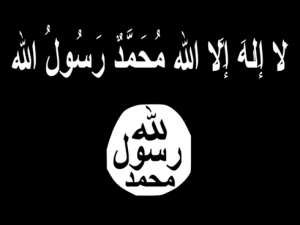ISISISIS “spreading like cancer” among refugees: NATO commander
General Philip Breedlove, NATO’s top commander, on Tuesday told a congressional panel that refugees from the Middle East and north Africa are “masking the movement” of terrorists and criminals. In testimony to the Senate Armed Services Committee, Breedlove said that ISIS is “spreading like a cancer” among refugees. The group’s members are “taking advantage of paths of least resistance, threatening European nations and our own,” he said.

One version of flag used by ISIS // Source: commons.wikimedia.org
General Philip Breedlove, NATO’s top commander, on Tuesday told a congressional panel that refugeesfrom the Middle East and north Africa are “masking the movement” of terrorists and criminals.
In testimony to the Senate Armed Services Committee, Breedlove said that ISIS is “spreading like a cancer” among refugees. The group’s members are “taking advantage of paths of least resistance, threatening European nations and our own,” he said.
Fox News reports that when pressed by reporters to back up his assertion with statistics, Breedlove said: “I can’t give you a number on the estimate of the flow.”
Breedlove distinguished between “criminality, terrorist and foreign fighters,” and said that he has seen news reports saying as many as 1,500 fighters have returned to Europe.
“I’m not going to talk to you about intelligence,” he said at a news conference after his testimony, adding that “many [countries] are saying they see planning happening” for a terrorist attack.
Congressional researchers and think tank analysts estimate that up to 1,500 of the foreign fighters who had traveled to Syria have returned to their Western home nations.
Counterterrorism experts agree that wars in the Middle East and north Africa have increased the flow of weapons, and possibly terrorists disguised as refugees, into Europe — but stress that the overwhelming majority of terror suspects and perpetrators have been home-grown radicals and sympathizers.
There is “a huge reservoir of sympathizers who all have western or European passports and who were born or raised there,” Reinoud Leenders, a professor at the Department of War Studies at King’s College London, told the Los Angeles Times.
